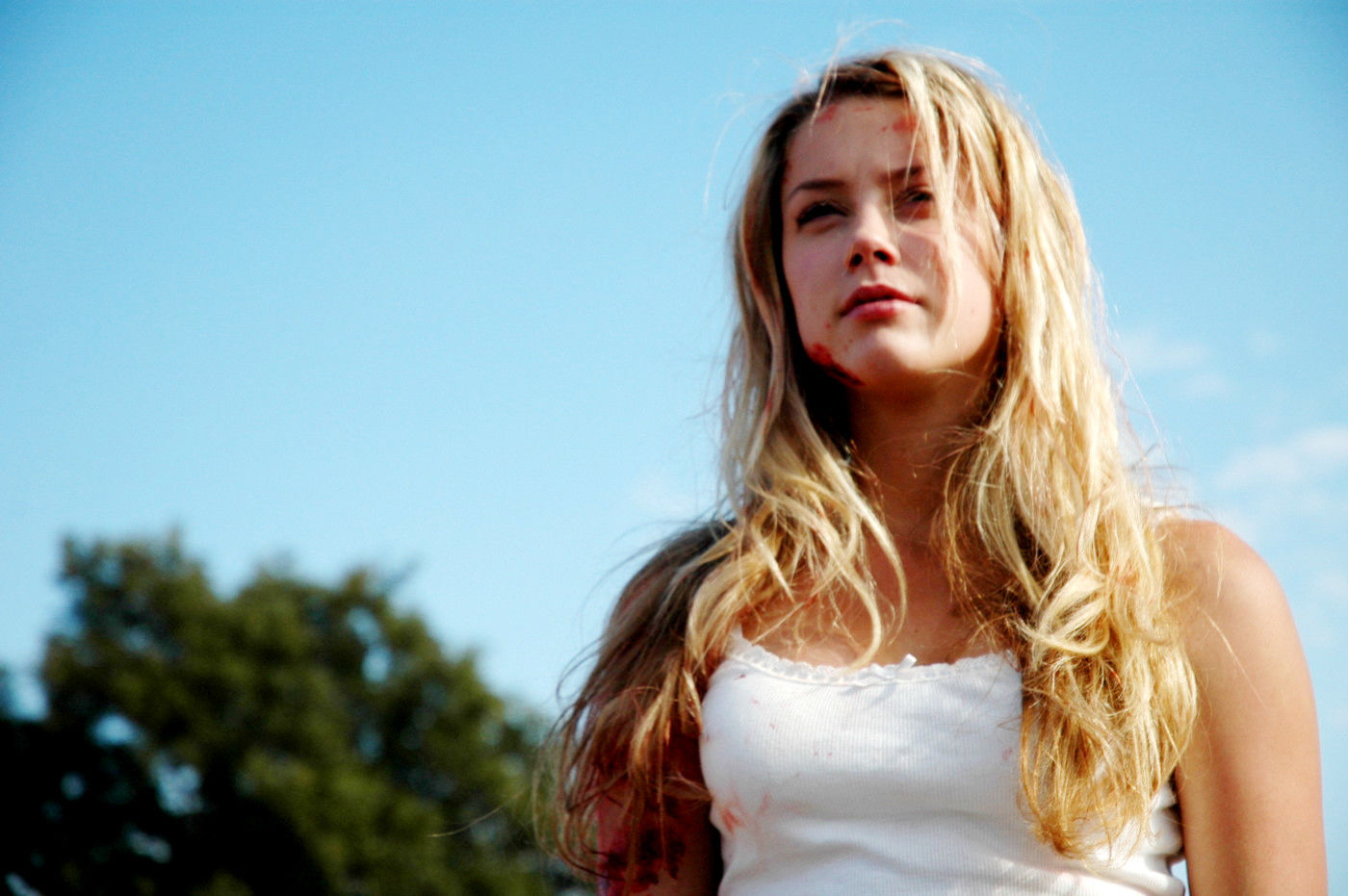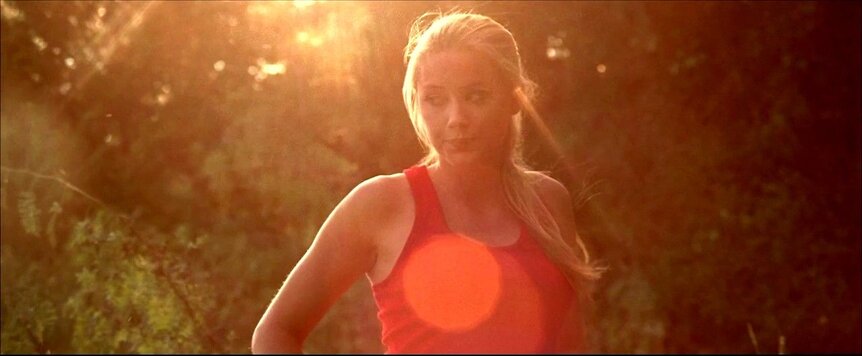Create a free profile to get unlimited access to exclusive videos, sweepstakes, and more!
SCREAMGRRLS: Amber Heard shines in an otherwise muddled All The Boys Love Mandy Lane

The allure of the unattainable is a powerful thing. We often want what we can't have, and that is made extra true by teenage hormones, when our bodies are thrust into adulthood often before we're emotionally ready, before our minds have even had the chance to fully process any of the physical changes that happen in the wake of puberty. And for young women, these changes can come with the unfortunate side effect of prolonged, unwanted male attention.
Such is the case in All The Boys Love Mandy Lane, whose titular lead finds herself simply trying to exist in a world that wants to objectify her solely because of her looks — and the decision she makes to embrace the power of her sexuality.
Coincidentally, the history behind the movie's release is longer and more storied than the film itself. Once production wrapped in 2006, All The Boys Love Mandy Lane was shown on the film festival circuit. After the movie's premiere at TIFF, The Weinstein Company snatched up the distribution rights, with part of the contract including a commitment to a wide domestic release via Dimension Films, their distribution company that specialized in independent and genre films. However, a negative audience response to test screenings, paired with a poor financial return on the studio's release of Grindhouse in 2007, prompted the Weinsteins to make the decision to sell the film to Senator Entertainment. However, their intention on distributing the film disappeared when the company's United States division went out of business in 2009. By then, All The Boys Love Mandy Lane was still getting play in festivals, and eventually premiered in international theaters starting with a UK release in February 2008. All this is to say that The Weinstein Company would finally re-acquire the rights to the film to give it a limited American release in 2013, seven years after its initial premiere in Toronto.
No doubt the significant delay between the movie's first showing and its eventual US release contributed to some of its most mixed reviews. During its conception, director Jonathan Levine (who would go on to direct films such as 2011's Warm Bodies and 2015's The Night Before) and writer Jacob Forman admitted that they took a page out of one of horror's most iconic films, Tobe Hooper's The Texas Chain Saw Massacre, as well as drawing from the John Hughes comedy oeuvre. Some similarities can also be noted between Mandy Lane's visual aesthetics and those of NBC's Friday Night Lights, another source of inspiration specifically cited by Levine and Forman in the writing of the script, and given that the film was shot on location in Texas it's easy to see why. But while all of the horror and '80s movie influences are recognizable, Mandy Lane decides to sacrifice any kind of consistent messaging for a supposedly "shocking" curveball in the third act — one the story never lays the groundwork for in the first place.
Amber Heard stars in her first leading role as Mandy Lane, a shy girl whose unexpected physical development puts her on the receiving end of all that aforementioned attentiveness of her male peers. The problem, however, is that Mandy is hardly interested in all the attention and seeks to deflect it at every turn — from the seemingly "nice" request for a kiss, to the more forcible attempts by a drunk jock to pull off her clothes at a pool party. It's clear that Mandy isn't used to or even remotely comfortable with being a constant source of objectification and sexual targeting, and it would d be one thing if the film used the near-unrelenting thread of her having to fend off unreciprocated advances on her physical space as a way to offer a thoughtful depiction of the issue of consent. But, unfortunately, that's not what happens.
For the entirety of the movie, Mandy Lane never feels like a fully recognized character. She is a puzzle, an enigma, conventionally pretty and soft-spoken, the object of male obsession and female envy. When she's invited to a small house party at a cattle ranch, her eventual acceptance is treated as something worthy of its own celebration, but it's difficult to understand why she's being held up on her own pedestal aside from the fact that she's, well, hot. Elevated by a better story, Mandy as the mystery girl could make an even stronger point, perhaps about how none of us are ever really entitled to someone else's time and attention — and how they're perfectly within their rights to say no, whenever and wherever they want to. But as soon as night falls and the murder starts, the script loses any attempt at trying to present a coherent, solid commentary on female autonomy and devolves into a revenge plot with no clear motivation on the part of its killers.That's right: killers, plural. The first is revealed fairly early on as Emmet, Mandy's former best friend turned social outcast who was shunned after a drunken prank gone wrong ended in the death of a classmate nine months prior. He rolls up to the ranch to crash the party and starts picking off his fellow teens one by one, seemingly in retaliation for all the bullying he's been subjected to — but the film's real "twist" comes when it's revealed that Mandy is in on the whole thing, apparently as part of a suicide pact the two had concocted together. Only once everyone else is dead does Mandy divulge her true plan: she was never planning to go through with killing herself, manipulating Emmet via his own love for her into committing the murders by his own hand and thereby absolving herself of any potential offense. But Mandy's reasons for luring Emmet into killing on her behalf are completely unclear. It would make more sense if her deadly plot was driven by her seeking revenge on all the teenage boys who believed they could get with her easily, but given how little time the film actually spends on Mandy's development, this attempt at subverting audience expectations just ends up falling flat.
Despite its muddled story, Heard's performance is what keeps Mandy Lane from becoming unwatchable. In many ways, she was the perfect choice to play the character, the young woman who's much more than just a pretty face. Her ability to switch between wide-eyed innocence and more cunning manipulation stands out within the film's smaller cast, and the only downside is that we don't get as much of her onscreen as her performance truly deserves. Watching Mandy Lane now is an undeniably different experience, especially in the context of so many public conversations surrounding sexual harassment and consent, but it's a shame that the story ultimately dismantles everything it's trying to say about rape culture and the complexities of female sexuality for the sake of a late plot twist that never fully pays off.















